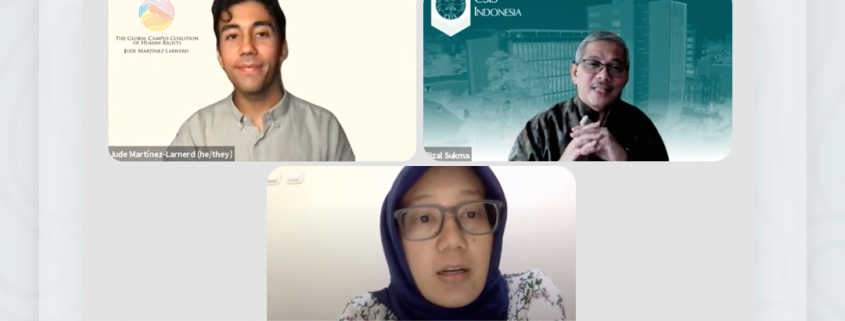Bincang ASEAN “Myanmar Protests and Unrest: A Test of ASEAN Diplomacy”
On Friday, 23 April 2021, ASEAN Studies Center Universitas Gadjah Mada held a Webinar Series titled “Myanmar Protests and Unrest: A Test of ASEAN Diplomacy” which was led by Managing Director, Yulida Nuraini Santoso. The discussion highlighted the campaign of #FreeSawLin and diplomatic efforts by ASEAN member states during this crucial time, especially as the member states were scheduled to gather at the ASEAN Leader’s Meeting on Saturday, 24 April 2021.
Nicolas Jude Martinez, a representative of the #FreeSawLin campaign from the Global Campus Coalition for Human Rights (GCCHR) explained that the campaign was launched to bring together people from all regions to fight for equality, restorative justice, and democracy, especially in education. The arbitrary arrest of Saw Lin Htet, a citizen of Myanmar, who happened to be studying human rights is just one out of the many cases of people who had been affected by the restriction of freedom to education by the military Junta. Education is the gateway to livelihood and this in turn helps to create an economic safety net which is much needed for communities at risk.
From a regional point of view, Dr. Rizal Sukma, Central for Strategic and International Studies (CSIS) Indonesia, and former Ambassador of the Republic of Indonesia for UK, Ireland, and IMO explained that if any change were to happen, this would greatly depend on the Leaders Meeting and the negotiation package put forward by ASEAN member states. Despite the large criticism of member states acknowledging the military Junta by welcoming them at the Leaders meeting, he argues that this is in fact necessary for a meaningful dialogue to take place and serves a greater chance for killings and fatalities to come to an end.
The discussion also discussed the coup being a momentum for revisiting the ASEAN Charter which had for a long time been critiqued by the international community for excluding meaningful notions of responding towards human rights above Centrality and the mandate that the ASEAN Intergovernmental Commission on Human Rights can play in a situation as such. Dr Rizal states that, “we need more than just sanctions, we need the support of the international community. But for now, what is most important is how to stop the killings and how ASEAN can come together to assist in order to create a safe environment for a meaningful dialogue.”
The full webinar discussion can be accessed on our YouTube Channel, titled Bincang ASEAN “Myanmar Protests and Unrest: A Test of ASEAN Diplomacy” by following the link below:
ugm.id/youtubeascugm
#ASEAN #SoutheastAsia #Myanmar #Coup #CSIS #GlobalCampusCoalitionForHumanRights #WhatIsHappeningInMyanmar #FreeSawlin #ASEANStudiesCenter #ASC #UGM




Leave a Reply
Want to join the discussion?Feel free to contribute!